The 2014 Crimean crisis
Why did the russians invade Ukraine?
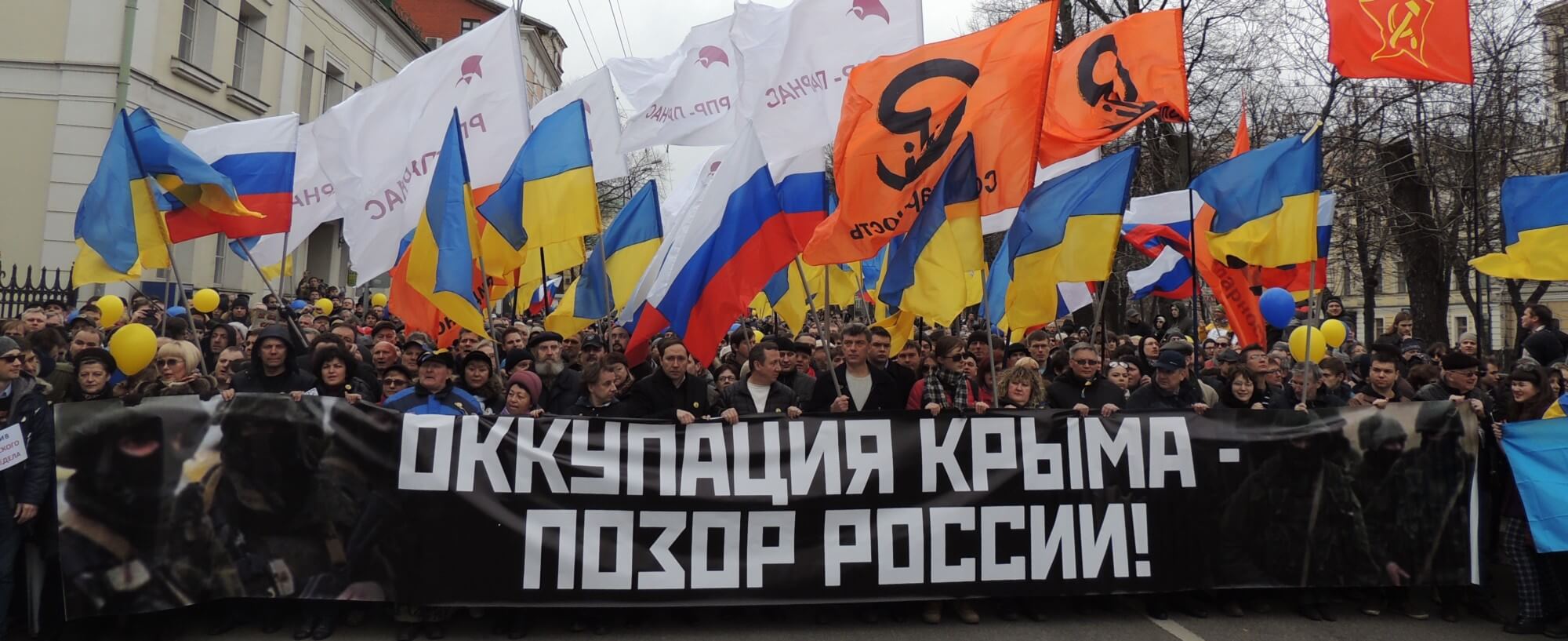
March of Peace” in Moscow, a gathering of anti-Putin demonstrators begging for the ending of the military moves in the Black Sea. (Source: “Bogomolov.PL” | Licence)
Contemporary International Relations discourse has been fuming over the ongoing annexation of Crimea by Russian authorities. Since the end of the French Revolution, much has been said about the right to self-determination. The revolutionaries are considered the main supporters of this concept, which would constitute one of the basis of the international system. Especially following the onset of the Cold War, decolonisation processes championed the idea of a nation-state. At that particular period, self-determination triumphed over a state’s sovereignty — if need had arisen, a country could have been split in two, or even more than two, in order to uphold the notion of “one nation, one state”. The United Nations even had a body called the Special Committee on Decolonization, in charge of monitoring the ending of the colonial era.
As time went by, however, a clear shift developed in the minds of policy makers, notoriously those who tried to achieve cohesion inside particular countries. Interventions and annexations could no longer be justified by evoking the nation-state principle. In fact, since the end of the decolonisation and post-Cold War dissolutions era, the only major secession of a country happened in 2011, due to the foundation of South Sudan. Even ostensibly “humanitarian” or “democratising” acts that involve external invasions have met fierce opposition — American successive incursions into Iraq and Afghanistan epitomise the controversies regarding the disrespect of a state’s autonomy.
This is why the current situation on Crimea intrigued many analysts, as it clearly represents a break with the past. It is widely known that, while the Russian government strives to maintain its territorial possessions, it also encourages separatist groups inside its neighbours. Yet there is no record, in the last couple of years, of a real attempt by Russia to expand its own borders at the expense of consolidated states — at least not by deploying military resources (although Russian soldiers are disguised as local Ukrainian rebels). In order to explain the state of affairs in Crimea, one must appeal to a framework of three different — but related — stances.
From an utilitarian point of view to an intangible one, it can be said that Russia’s attitude towards the quasi-independent peninsula relies on the following purposes: the economic interest on the gas fields and pipelines that exist in the region, an effort to counterbalance Western expansionism in Eastern Europe, and Vladimir Putin’s desire to re-establish the Russian grandeur that characterised the first decades of the Cold War. In a sense, virtually all scholarly literature about the Crimean crisis has focused on, at least, one of the aforementioned aspects. This essay shall develop as follows: firstly, it will scrutinise each of the hypothesis proposed to explain the issue; secondly, it will suggest possible outcomes of the situation; and, finally, it will conclude by posing a question to be considered by policy makers of this decade.
The three hypothesis
Most likely causes for Russian behaviour
1) Economic interests
This year, as soon as the Russians had shown interest in Crimea, some argued it could be explicated by Russia’s — and, specifically, Gazprom‘s — supremacy ambitions in the oil and natural gas business. According to the East European Gas Analysis (EEGA), “one of the leading experts in cost-benefit and financial analysis of production and pipeline projects in natural gas sector of Russia and the former Soviet Union”, Crimea hosts two onshore gas fields and parts of two pipelines, as well as an underground gas storage facility. In addition, EEGA claims there are three offshore gas fields near Crimea, which could be exploited by whomever takes control of the peninsula.
Crimea also provides a crucial strategic seaport, as it could improve Russian advantages on the Black Sea, by having another hub for the Eastern Mediterranean and the Middle East. Consequently, waterway transport of fossil fuels would be facilitated. Considering both of these issues, one might be tempted to argue that the annexation of Crimea should prove an excellent move by Russia. On the other hand, the factors that triggered the intervention are not self-evident. By restricting the analytical scope to the economic aspects of the Crimean crisis, one commits the fallacy of insufficient samples.
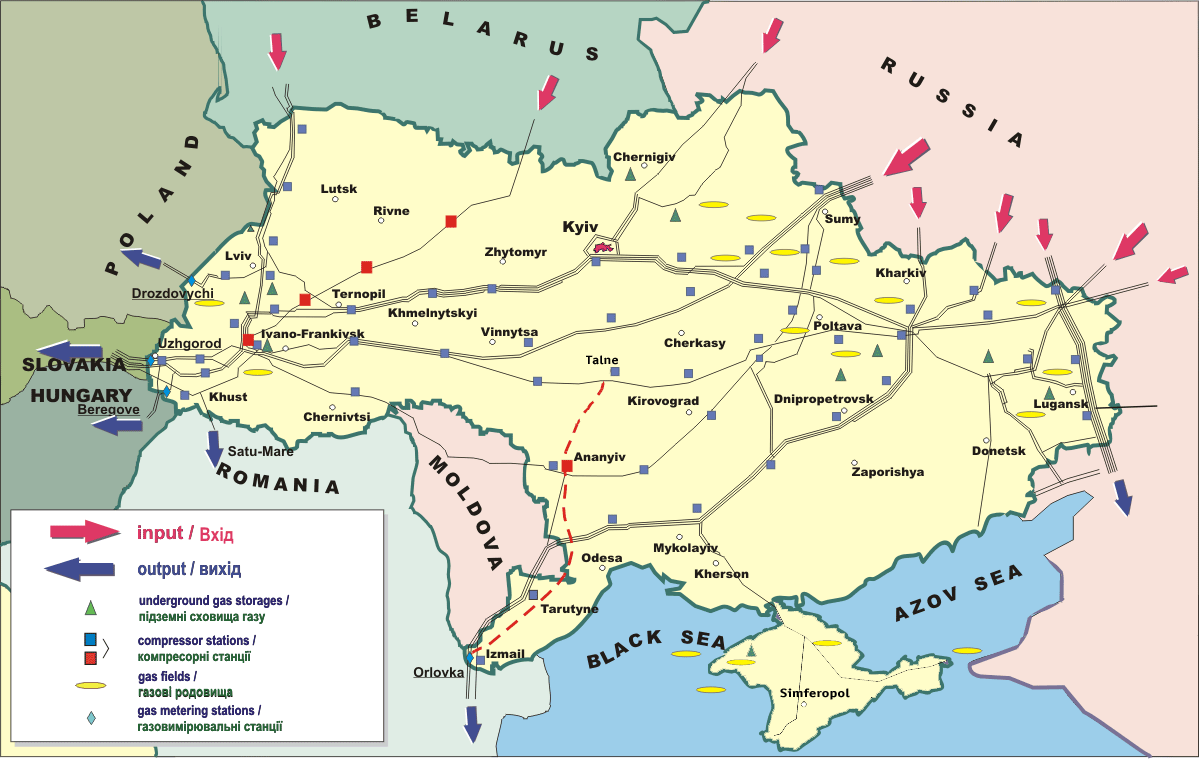
Map of gas-related facilities in Ukraine. Near the Crimean peninsula, it can be seen 3 offshore gas extraction sites. Onshore, there are, as well, 2 other gas fields. (Source: “EEGA” | Reproduction is authorized when EEGA is referenced)
Gazprom, company mainly owned by the Russian government, which is in charge of extracting and selling fossil fuels and derived products, does not seem to need help in its business. Forbes places the giant corporation at the top three oil and natural gas companies of the world, ranking second in quantity of barrels produced per day. These statistics will definitely be even more magnificent once Crimea has been fully integrated into Russia. However, one would be right to assert that the current status quo does not demand an immediate betterment of the gas industry in Russia, as it already has a key role in the global market.
Nevertheless, even though the oil and gas side of the issue is not the only economic factor behind Russia’s attitude, it is one of the reasons why, economically thinking, the annexation of Crimea — expensive as it is — might ultimately pay off. A report by Nunn and Foley for The Independent claims the Kremlin has been planning this invasion since 2008. According to the authors, by “annexing all the land adjoining the Black Sea, Russia would also annex the offshore rights and anything found therein”. The catch is that oil and gas business is not the ends of the Russian action, but rather the means.
In itself, this industry does not need support. Yet, it might catalyse the Russian economy out of its current reduced growth levels. In 2001, Russia (along with others) has been praised by Jim O’Neill as “emerging”, a country which was expected to rise economically until 2050, when it would join Brazil, India and China as the richest states of the globe. A series of problems — culminating in the crisis of 2008–9 — has slowed down Russia’s ascent, which began to recover just recently. Still, the country’s financial system requires significant stimulation. What could be better to help Russia regain its wealth than the sector in which the country is already specialised?
The thesis that the conquest was planned much before the chaos provoked by the Ukrainian Revolution, as a way to improve the Russian economy, offers a comprehensive approach to the Crimean 2014 crisis. On the other hand, as argued, one should be cautious not to analyse the situation only through this spectrum. To broaden our understanding, but still thinking on a practical level, we shall consider, in the next sub-section, the possible influences of Western expansionism throughout Eastern Europe in Russia’s belligerent behaviour.
2) A retaliation against NATO and the European Union
During the Cold War, two supreme structures operated according to a balance of power logic — the Warsaw Pact and NATO. Following the demise of the Soviet Union, the capitalist group remained intact, while the socialist one perished. More than prevailing globally, NATO has actually expanded throughout the last decade. Since 1991, twelve countries have joined the alliance, ten of those coming from the Warsaw Pact. The other two, Slovenia and Croatia, came from another socialist nation, Yugoslavia.
This brazen Western incursion into territories previously under the aegis of the Soviets — and, by comparison, the Russians — is certainly being viewed with suspicion by the Russian elite. Not only has the West implemented security agreements with those regions, but also the European Union has admitted some countries from Eastern Europe into its rosters. In an anarchic setting, despite all the efforts to establish an international framework based on law and institutions (the UN being the most obvious example), it is natural that Russia feels intimidated by the growth of a rivalling force.
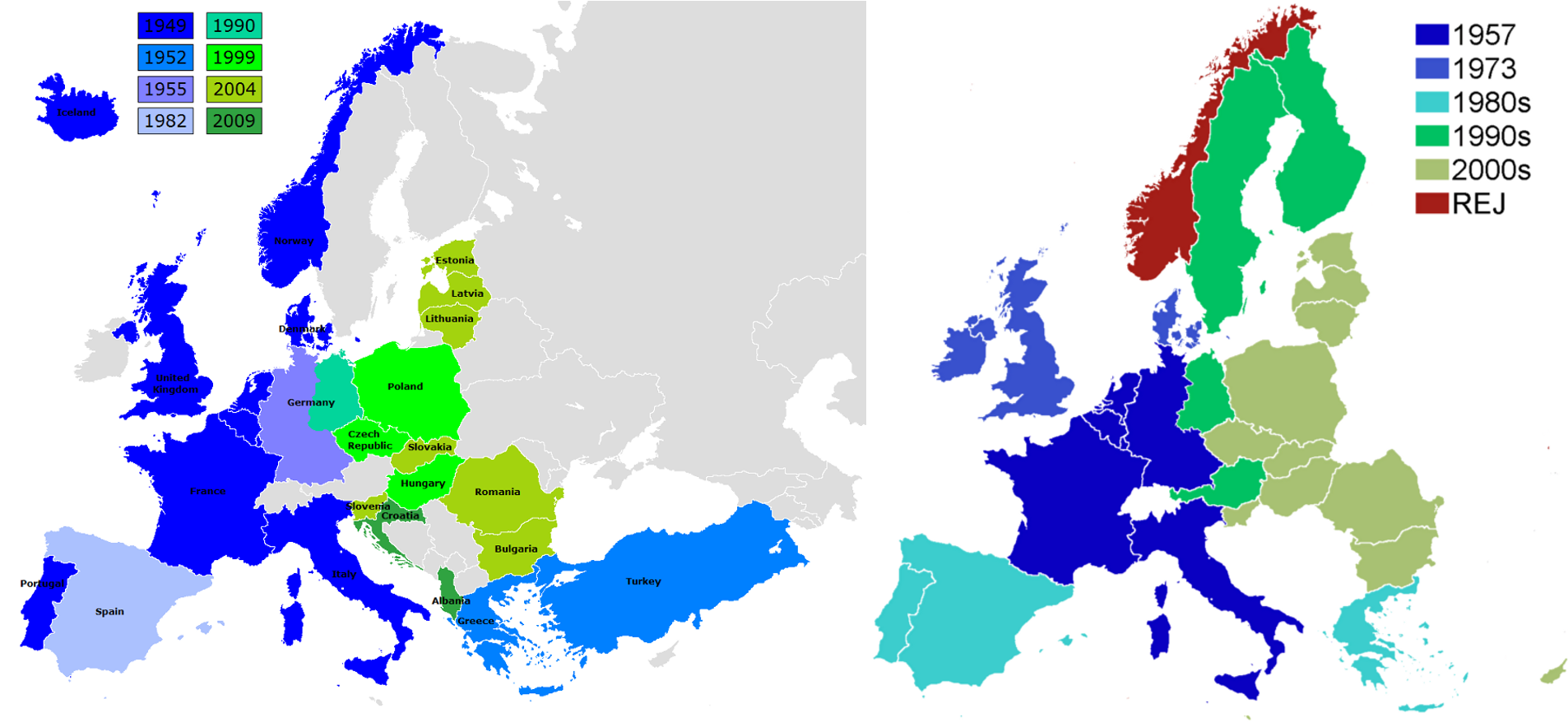
Left: Map of the expansion of NATO in Europe, by the incorporation of former soviet-controlled areas.
Right: Map of the expansion of the European Union according to the year of admission of new members.
(Source: “JLogan” | Public domain and “Kpalion” | Licence)
Putin may have been influenced by the values expressed by Randall Schweller in his essay The Problem of International Order Revisited. This paper aims to criticise John Ikenberry’s claim that international institutions might restrain the power of strong states. Schweller contends that NATO serves to “to keep America in, Germany down, and Russia out” — that is, the alliance serves to promote American interests. Taking this into consideration, the Western expansion should be equalled to the expansion of the United States’ capabilities. Since Russia has inherited from the USSR the position of America’s rival, any increase in NATO represents a huge threat to the idea of a “Russian motherland.”
Geopolitically speaking, the annexation of Crimea expresses two Russian reminders to the world. Firstly, Putin clearly demonstrates that his country is capable of circumventing international guidelines when it is in their national interest — much like what the United States has done when invading Iraq without authorization from the United Nations Security Council. Secondly, the ruler makes it clear that he will not yield to Western ambitions in the former soviet areas — especially those that host major resources that Russia could use. In any case, there is no diplomatic alternative: the conflict is a zero-sum game in which all there is left for Russia to do is try and contain a menace to its ideals.
By incorporating Crimea into their territories, the Russians were, thus, able to satisfy two different ambitions: an economic and a political one. However, there is no way to convince a people of the necessity to go to war by using exclusively political or economic arguments. After all, something must prompt the population to accept — and even support — the conflict; otherwise, it will be destined to founder. In this context, it is important to investigate which intelligible aspects factored in the decision to invade Ukraine and occupy Crimea.
3) Russian status or Ukrainian self-determination?
When Vladimir Putin addressed the Federal Assembly, about Crimea, he employed a tone of speech that appealed to the emotions of the Russian population. Even though the region has not always “been an inseparable part of Russia” — it has previously been occupied by other civilisations –, this remark helped to foist the people onto accepting the president’s actions. In fact, Putin’s entire speech consisted of messages to Russia’s inhabitants and to the rest of the world.
In this primary level, Putin was based on the ideals of the “Soglasiye vo imya Rossiya” (“Accord in the Name of Russia”), a group of intellectuals who were preoccupied with the decline of the Russian state after the collapse of the USSR. According to them, Russia was a sui generis civilisation, and it needed to ensure its own glory. As such, the end of the USSR represented the “major geopolitical disaster of the century”, as it deprived Russia of the status it supposedly deserves. Domestically, the government emphasises the country’s own benefits from acquiring Crimea, as it would contribute to the recovery of the Russian splendour.
This standpoint, of course, is meant to take advantage of nationalist assumptions. In the midst of an authoritarian state, with a failing economy and a geopolitical decline, this is the last hope for renovation. The weak administration must be seen as a champion of the people’s interests, an indispensable structure that provides the basis for an ascension to primacy. By urging the unity of the nation around the prospect of developing and becoming the next hegemon, therefore, Putin guarantees the sponsoring of his decisions and his governmental practises as a whole.
When talking to the rest of the globe, however, the Asian power hypocritically neglects all of its internal claims of honour and magnificence, choosing, instead, to justify the intervention in Crimea as the respect of Russo-Ukrainians’ right to self-determination. In the international arena, the intention is to invalidate any disagreements about the way the Russians have dealt with the situation, in order to save, at least, a part of the country’s reputation — severely blighted by the accusations of disrespecting human rights and preventing the consolidation of a real democratic governance.
It can be inferred, thus, that the 2014 Crimean crisis might be explored through three ramifications: economic, political, and abstract reasons to the intervention in Ukraine. Each of them presents a different view into the situation, but all are required for a thorough inquiry into the issue. The next section will discuss whether the crisis will bring about some significant impacts that have been suggested by contemporary literature on the subject.
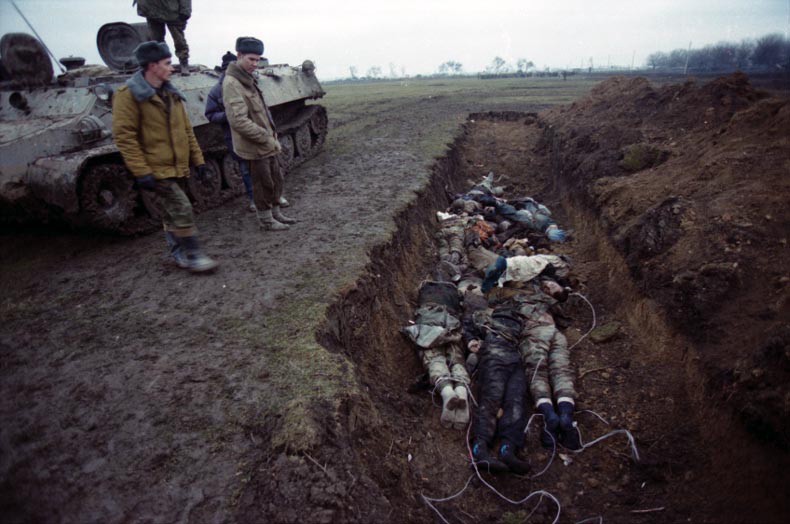
Photograph of a mass grave in Chechnya, where Russian forces have been accused of committing a series of human rights violations. Ironically, the country claims it will protect the rights of Ukrainians in Crimea. (Source: “Natalia Medvedeva” | Licence)
The expectations
As would happen with any other major international event, the occupation of Crimea is sure to usher in a string of changes in the relations among sovereign states. The direct involvement of two great powers — remnants of the Cold War, the US and Russia — increases the risks of disrupting the stability of the international order. The transformations, however, might imply more than militarist or balance of power subversions. They could affect just as well the political affairs of Russia, Europe, and the United States. Moreover, economical matters should not be disregarded.
There is widespread concern that the annexation might set a precedent for allowing the indiscriminate use of power by the world’s strongest states. Some countries — the US, Saudi Arabia, Israel, and North Korea, to name a few — have been ignoring the supposedly binding treaties they have signed in a myriad of areas. On the other hand, these violations have not represented an attempt to obtain eternal control over a given territory, while Russia’s latest move has this clear goal. Is Putin ambitioning to conquer more than what he has currently done? This question lies at the heart of the expectations provided by the incursion.
In case Russia might be willing to invade and occupy Ukraine as a whole, would it be an overstatement to predict the possibility of a Russian-Ukrainian war? This scenario, although far-fetched, is certainly on the minds of the diplomatic services of the Security Council’s other permanent members. Ukraine has vowed to protect its territorial integrity — that is, to try to recover its peninsula from Russian domination. The prospect of an armed conflict is not rejected, even if it means only retrieving the parts of the country that have been invaded. The Ukrainians are resolutely refusing to give in to external coercion, and the extent to which their determination acts will define how far they shall go to preserve their status.
Based on the premises discussed in the hypothesis of an action to counterbalance Western — and, in particular, European — expansionism, one can argue, instead, that this Russian move should prove an attempt to acquire a bargaining tool to be used when dealing with the European Union. Indeed, gas pipelines from Russia to Europe cross Ukrainian territory; and the EU is mostly dependent on this gas to supply its population. Consequently, a direct control by the Kremlin of these fuel transportation networks (not forgetting, of course, the extraction sites located inside Crimea) would increase the parliament’s influence over its European counterparts.
Remarkable is, however, to realise that this geopolitical dependence could be — to a certain degree — easily offset by the actions of the United States. Much has been debated whether US power has been in steady decline, and the country’s lethargy is best expressed by the Obama approach to global matters — indecision, slowness, and indifference. With a strengthened Russia, handling a main gas-producing region, it is expectable that Europe will search for alternative sources of energy, and will try to reinforce its ties to America. It should be observed, in the following months, an European attempt to push forward the consolidation of the Transatlantic Trade and Investment Partnership (TTIP) — a proposed trade agreement between the US and the EU. The settlement would give the latter a way out of Russian political pressure and the former greater power in a world characterised by the ascent of “emerging” BRIC and MINT.
Conclusion
It can be seen, therefore, that the Crimean crisis of 2014 affects several aspects of contemporary international relations. The globalisation processes have created such an interdependence among countries that almost no single situation stands alone in the world, without having repercussions. The externalities provoked by the crisis outreach the limits of the Crimean borders and, in fact, might reflect in the diplomatic discourse of countless countries — in particular the US and the European powers. This is the why one should not attribute the situation to a unique reason, but, conversely, assess the multiple factors involved in the policies of the concerned actors.
As noted, the current impasse might be explained through a practical point of view — focused on political and economic issues — or an immaterial one — pointed towards the Russian and the (supposed) Crimean opinions about the annexation. In any case, it is evident the dilemma has ample implications, some positive, others not so much. The actions of rising powers — or powers through recovery processes, such as Russia — might, purposely or inadvertently, prompt changes in the balance of power, as they seek to change the status quo. What is left to clear up is how the international community should react to the contemporary power changes, notably those triggered by the “emerging” nations.
Some will contend that the consolidation of a multipolar world will allow a democratisation of policy-making practises in the twenty-first century. As they say, manifold voices can help the solving of worldly issues, for instance, global warming, by bringing into debate the expertise of different actors. Others disagree, claiming the voice opportunities shall lead a problem — as everyone might express their particular views, no decision is actually taken. Independently of the way these transformations occur, the Crimean crisis has been helping to bring about some of them.
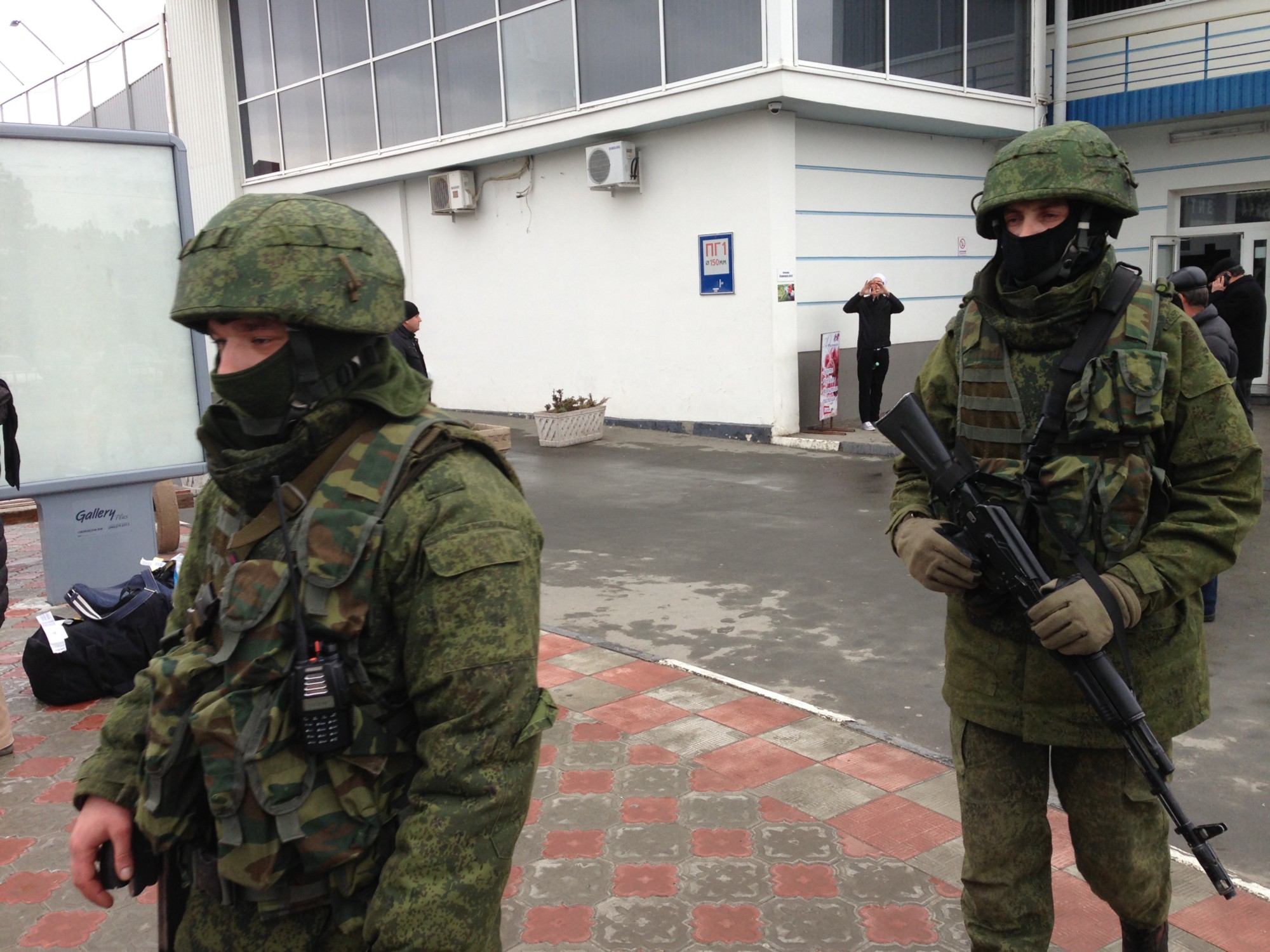
Unmarked Russian soldiers in Crimea. Russia has disguised its soldier as local rebels, in order to claim it has not effectively invaded Ukraine. (Source: “Elizabeth Arrott / VOA” | Public domain)
Sources and related articles
- Le lexique pour tout comprendre à la crise en Ukraine
(Le Monde article — in French) - The Problem of International Order Revisited
(Randall Schweller article) - The World’s 25 Biggest Oil Companies
(Forbes report) - Why does Putin want Crimea anyway?
(euobserver article) - How Far Will Putin Go?
(Foreign Policy article) - Putin’s Calculus
(Joseph Nye’s contribution to Project Syndicate) - Putin's brain
(Anton Barbashin’s and Hannah Thoburn’s article on Foreign Affairs)